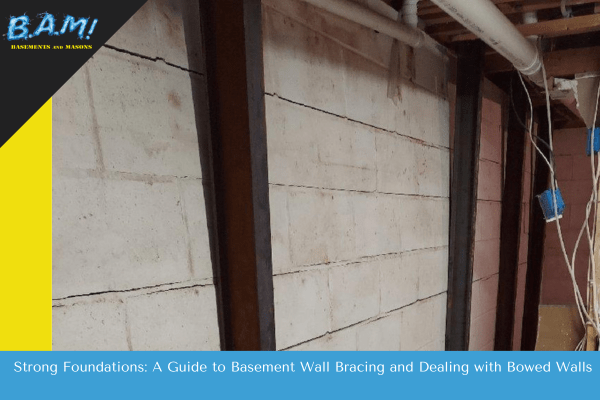When it comes to the structural integrity of your home, your home’s foundation plays a pivotal role. Your home’s foundation is more than just concrete; it’s the cornerstone of your living space. Unfortunately, foundations are not immune to issues, and one common challenge homeowners face is bowed walls. Let’s explore everything you need to know about basement wall bracing and how to effectively address bowed walls, ensuring your home stands strong for years to come.
The Importance of a Solid Foundation
Before we dive into the nitty-gritty of basement wall bracing and bowed walls, let’s emphasize the significance of a robust foundation. Your home’s foundation serves as the support system for the entire structure. It bears the weight of your house, distributes it evenly, and keeps everything in place. A compromised foundation can lead to a cascade of problems, from structural damage to reduced property value.
Why Would You Need Basement Foundation Wall Bracing?
Why is your basement foundation wall bowing?
Well, it could be because of a couple of reasons.
Expansive soil – If the soil around your basement walls is made of a lot of clay, it can be considered expansive soil. This type of soil grows and shrinks based on moisture content. When the soil absorbs water, it expands. Then, when the soil dries, it shrinks. The constant growing-shrinking cycle places stress on your foundation walls and can cause them to bow.
Hydrostatic pressure – Hydrostatic pressure is when water pools up outside your basement wall and has nowhere to go. As the water builds up, the volume of the soil increases. This increase places pressure on your home’s foundation wall and can cause them to bow.
Frost-heaving – If the soil freezes outside your home’s foundation, there is a chance it can lift up. Then, when the soil thaws, the soil settles back down. This up-and-down movement can cause your basement walls to bow.
Lateral pressure – If something heavy is placed outside your basement walls, such as a dump truck, it can press down on the soil and cause your basement walls to bow.
Tree Roots-Tree roots can be very disruptive as they grow and push against your home’s foundation, causing them to crack and bow in.
What is Foundation Wall Bracing?
Foundation wall braces are steel braces put in place to help the home’s foundation cope with the weight. They are also one of the most effective ways to repair and restore basement foundation walls and to protect homes against further foundation damage. The braces counter the external pressure that causes basement walls to curve.
Bowing Walls Can cause these different problems
Water Leaks in the Basement-Water leaks and excessive moisture in your home’s basement can cause a lot of damage to your home. It can also cause mold and mildew to grow. When it is very cold, water or moisture trapped in the cracks will freeze and cause even more damage. The frozen water expands, which will cause the size of cracks to stretch and even break. Installing a steel brace to hold your foundation in place will help when repairing and waterproofing your basement.
Buckling Basement Walls– Buckling or bowing walls can happen from moisture, the weight of the house, or just old age. The steel wall reinforcement braces will provide added support for older foundations that may be buckling inward due to the weight of soil and water on the outside. With these braces installed, it will stop further damage to the foundation and help move the foundation walls to maximum recovery.
Cracks, Breakage and Collapsing– Without the braces, foundations can get damaged and develop cracks, pieces can break off and foundation walls can eventually collapse. The braces are in place to stop that from happening. If they are in place and you get cracks, the repairs are much easier to do. There is no worry about the foundation wall collapsing down and causing further damage. It is a bit of added security and peace of mind we can all appreciate.
BRACES TO HELP FROM FURTHER FOUNDATION DAMAGE
The braces are in for the long haul. That means any future damage will be minimal. They offer permanent support for the home. They have been used for a long time and have a very good track record when it comes to doing their job.
Basement Wall Bracing: Why You Shouldn’t Do It Yourself
Foundation Specialists do not recommend DIY basement wall bracing. If done incorrectly, you could seriously damage your basement walls, which in turn can damage the rest of your home. Here are some of the most common issues with DIY solutions.
You could break your basement wall.
Also, you could overtighten the wall and pull it too far outward.
You could use an incorrect number of braces or fail to space them correctly.
Get A Foundation Repair expert and Solution for your home
If you suspect there may be some Home Foundation structural damage or want to get out ahead of any, call us for a free estimate. An older house may not be showing any signs of Foundation damage, but it does not mean there aren’t any.
Here at BAM Basements and Masons of Des Moines, we pride ourselves on delivering every consideration to total customer satisfaction with the highest quality workmanship, limited lifetime warranties, having over 100 years combined of expertise on waterproofing, we are locally founded, owned, and operated. Call us for all your waterproofing needs and we will find a customized solution to fit your home’s needs.
BAM Basements and Masons of Des Moines is your premier basement waterproofing, foundation repair and egress window company serving the Des Moines, Iowa area. If you’re located in Des Moines, Ankeny, Bondurant, Altoona, Pleasant hill, Ames, Adel, Waukee, Indianola, Grimes, Urbandale, Johnston, West Des Moines, or the surrounding areas, we’re the place to call.


